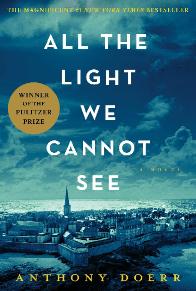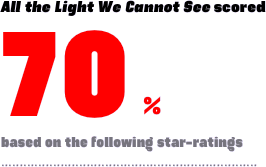 |
||||||||||||
 |
 |
|||||||||||
 |
 |
 |
 |
 |
 |
 |
||||||
 |
||||||||||||
 |
 |
 |
||||||||||
 |
||||||||||||





What was it about?
The book begins with the American bombing of the French town of St Malo. Two people in particular are caught up in this, Marie-Laure, a blind girl, and Werner, a young German soldier. The story then jumps back to their childhoods; Marie-Laure growing up in Paris with her father who was a locksmith and, told in parallel, Werner's story of living with his sister Jutta in an orphanage. We also learn of a fabulous diamond, possibly cursed, that has to be spirited out of Paris when war breaks out.
What did we think of it?
In general we loved the way this was written with so many details beautifully evoked, such as Marie-Laure's exploration of the museum through touch, or the magic of Werner and Jutta's discovery of the radio. We found Marie-Laure a strangely blank character; for some it was hard to get a sense of anything more to her than 'sweet little blind girl' and we wondered about Doerr's female characters versus his male ones – even eccentric uncle Etienne seemed to have more of a character arc. The portrayal of Werner's situation really brought to life the way the Nazi's gradually assumed absolute control, by inculcating a generation of boys with no other choices.
For some the narrative was 'bitty', a series of vignettes disguising quite a plain story, but for others that story was strong enough to carry them through, overriding any reservations about the the back-and-forth structure (which some commented felt like a device to introduce tension). We wondered whether the epilogue was necessary, and mused on whether the book was almost too balanced – some found it to be perfectly crafted but somehow this detracted from the whole, with no sense of a single overarching story arc, while others admired the way the author wove everything together. There was also an issue over the language, in particular Americanisms such as 'taffy' (Frederick has 'taffy coloured hair') that we debated for a while; the author may not ever have anticipated the book being read outside of an American audience, yet at the same time would it not have been more true to the time and place in which the novel was set to avoid very specific Americanisms? For some these jarred and brought them out of the story.
We were struck the theme of 'what you could be' and the sense of the lives they might have lived had these characters only lived in another time. And we considered the Pulitzer prize, and whether this novel was a worthy winner. We all enjoyed it, but should it have been singled out as something to go down in posterity? It was unquestionably a good read, but a future classic? We weren't sure.
Would we recommend it?
Despite various reservations on the whole we found this a gripping story, beautifully told. Highly recommended to anyone who likes a good page-turner or is interested in this period of history.
Also discussed
Game of Thrones • Kindles vs. real books • libraries • Norwich • Private Eye book reviews • relational aggression • cheating at quizzes
![]()
![]()
Beautifully written and well-balanced. I enjoyed all the characters and I liked the way he wrote the ending. I was moved by it, and there were many moments that linger on in my memory. I was glad to be reminded of how things were for people living during this period of history.
![]()
![]()
I found the descriptions poetic and I loved the way Doerr noticed such tiny things, the way Marie-Laure experienced her world through sound or touch. This was an unfamiliar subject for me in that it dealt with the build-up to the war and how the German youths were prepared to become soldiers – Doerr shows they didn't have any other options. I thought the ending was amazing, people trying to go back to normality having experienced something unforgettable. I liked the way this was seen from the German perspective; innocent people were dragged in to the war without having a say in it, and after Germany lost it was like they weren't allowed to grieve.
![]()
![]()
I found this very contrived; I could never get past that even though I liked Doerr's style, his descriptions and the poetic quality of the writing. But I couldn't ever get past thinking 'what would George R.R. Martin have done with this?' I felt detatched the whole time while reading it. It didn't seem to me like a book people would reread, the subject felt like quite a well-trodden path, I don't really see what's new.
![]()
![]()
A warm three-and-a-half. For me this was full of contradictions – a parable masquerading as an epic. I found some parts of the writing truly excellent while others were weak. I think Doerr writes about intimate things exceptionally well and I was continually invested in the characters and how they reacted to the things that happened to them. I was very pleased to have a reason to read and discuss this as it's the sort of book you want to talk about with others.
![]()
![]()
I thoroughly enjoyed this. It was a great read that kept me turning the pages but I'm not sure it's really going to linger with me. I found odd anachronisms and American terminology jarring and these prevented me from getting swept away by the plot. This hasn't stopped me recommending it to others, though.
![]()
![]()
I found the language incredibly cinematic. I was struck by the way when writing about Marie-Laure Doerr only wrote about her other senses, never what you could see. I quite like very 'plotted' novels so this especially appealed to me and I admired the way it was all woven together.
![]()
![]()
I was captivated by this book and thought the author dealt with difficult themes incredibly well, and I loved the poetic quality of his descriptions. And yet somehow I wasn't convinced by the characters – even as Werner's story made my heart ache; through him Doerr brilliantly illuminates the story of a generation of 'lost boys' forced to become soldiers. But otherwise characters felt like archetypes to me, rather than real people and while I loved it, I'm not sure reading this has changed me in any way.
![]()
![]()
This really lost momentum for me somewhere around the midway point. I did finish it but only after skipping ahead to find out what was going to happen and then getting re-engaged. The switching back and forth in time and between characters via such short choppy chapters meant that I just didn't feel all that deeply involved. Ultimately it was a good read, but not a great one and I've no idea how it manage to win the Pulitzer. It didn't do anything new or different to my mind.
